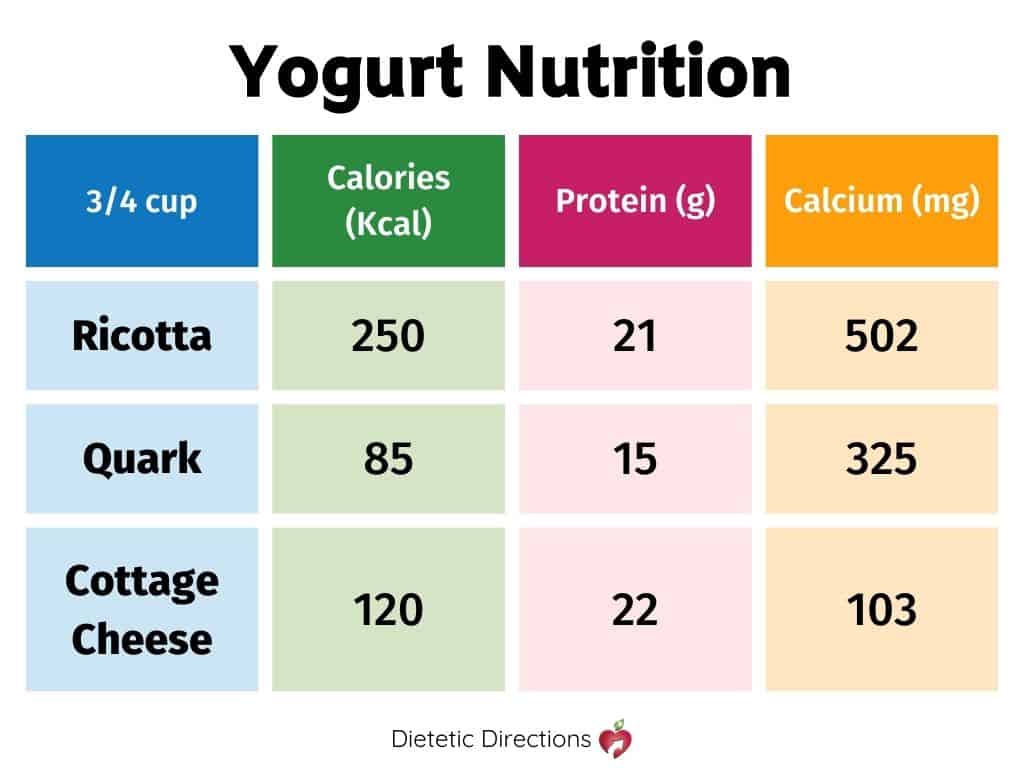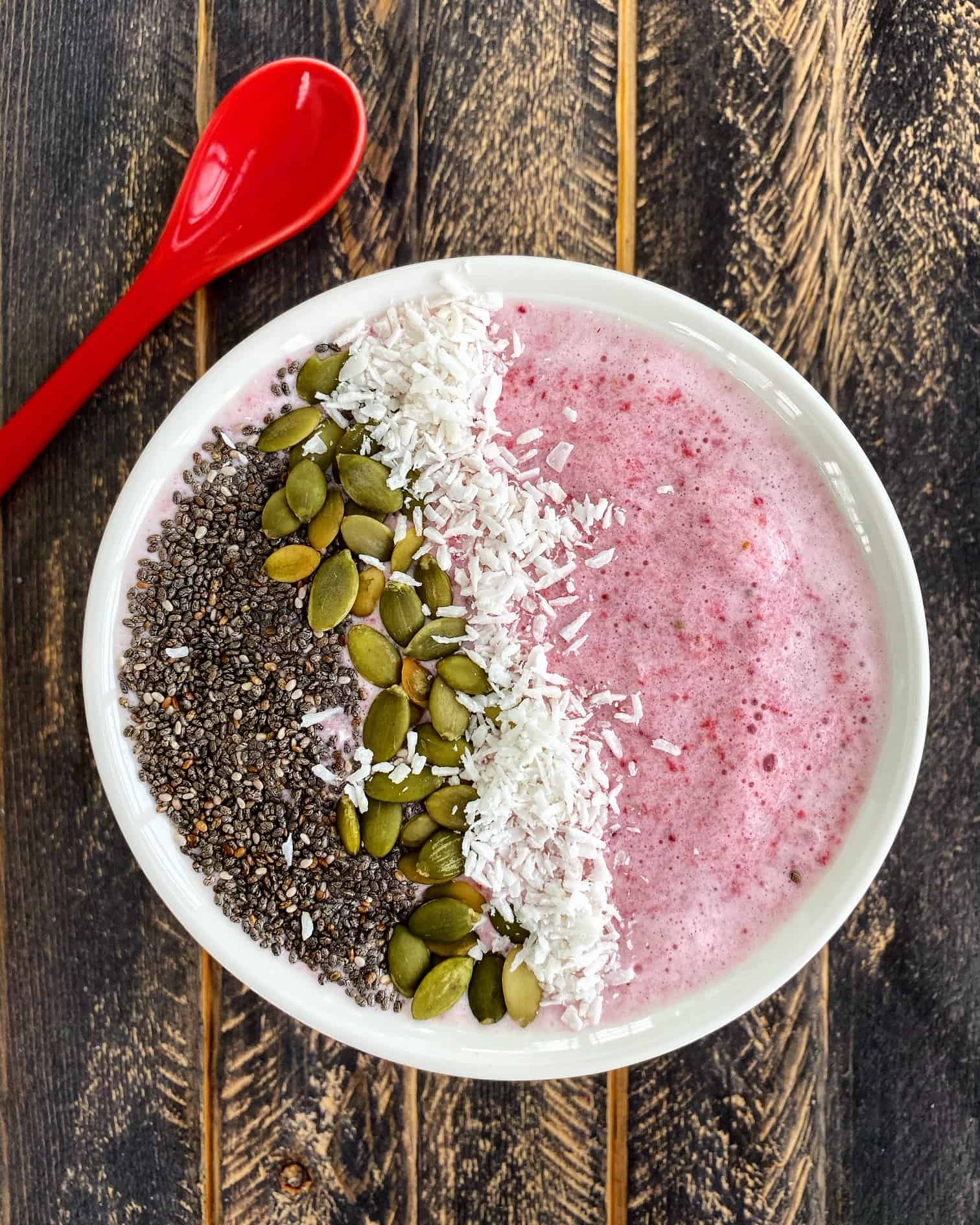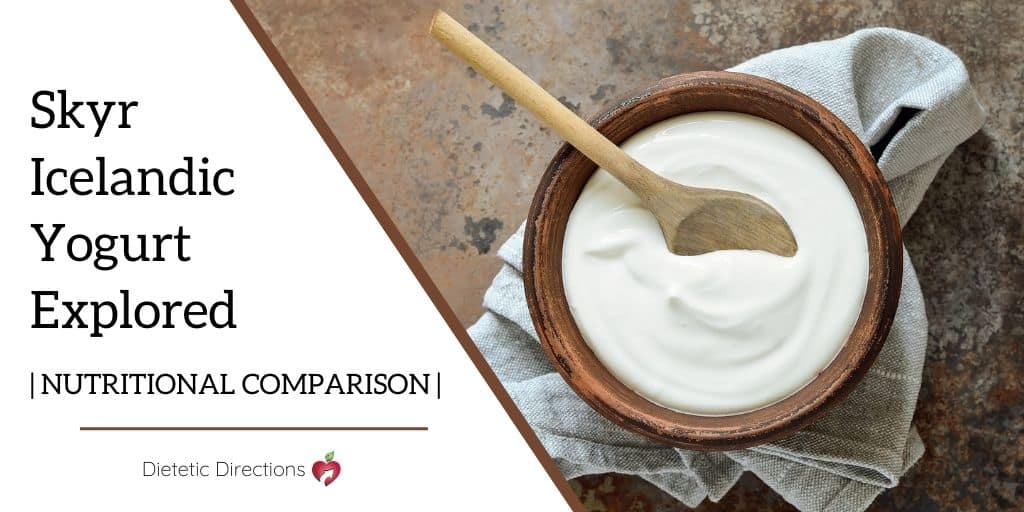
Skyr Icelandic Yogurt Explored
Have you tried skyr Icelandic yogurt? It’s a thick, creamy yogurt that’s been around for over a thousand years! Nevertheless, skyr is becoming increasingly popular and more available at your local grocery stores. Additionally, it packs an impressive nutritional punch with high levels of protein and it’s an excellent source of key nutrients like calcium and phosphorus. Furthermore, skyr supports bone health and heart health. This includes supporting healthy blood pressure and skyr may even help in regulating blood sugars.

Skyr Icelandic Yogurt is a high protein and an increasingly popular option! Learn more below.
Today’s blog will explore skyr Icelandic yogurt. Specifically, how to make it, how it compares nutritionally to other yogurts, and finally, how to incorporate it into your diet. Get ready to ‘scoop’ right into this delicious dairy option!
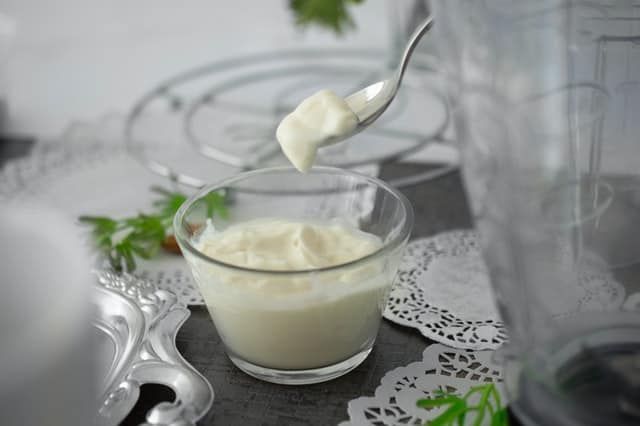
What’s Unique about Skyr Icelandic Yogurt?
Skyr (pronounced ‘skeer’) is distinctive in a few ways:
- Nearly four cups of milk are required to make one cup of skyr. This gives it a thicker, creamier texture than a traditional yogurt.
- It’s always made from skim milk (often a lower fat alternative to other yogurts).
- During production, milk is warmed and live bacteria cultures are added. Note: Yogurt cultures are very distinctive to each product.
- Skyr is strained more thoroughly giving it a creamier taste.
- Therefore, the whey (aka the lactose-containing, liquid by-product after the curdling of themilk) is completely removed during straining.
- Consequently, skyr Icelandic yogurt is a lower lactose alternative with about 90% of lactose removed in the straining.
What’s the Nutrition of Skyr Icelandic Yogurt?
- Skyr is significantly higher in protein than regular yogurt. In fact, skyr Icelandic yogurt has two to three times more protein than regular yogurt.
- It’s even slightly higher in protein than Greek yogurt. Therefore, 3/4 cup of skyr yogurt has around 20 grams of protein – nice!
- It can be a lower sugar alternative. Be sure to always look at the Ingredient List to see if any sugars are added. Skyr generally is unsweetened with only naturally occurring sugars. (For example: 3/4 cup serving of Skyr Icelandic yogurt has around 5 grams of naturally occurring sugar).
- It’s also an excellent source of calcium with about 20% of daily requirement in a serving. Check out our blog on bone nutrition and calcium-rich foods.
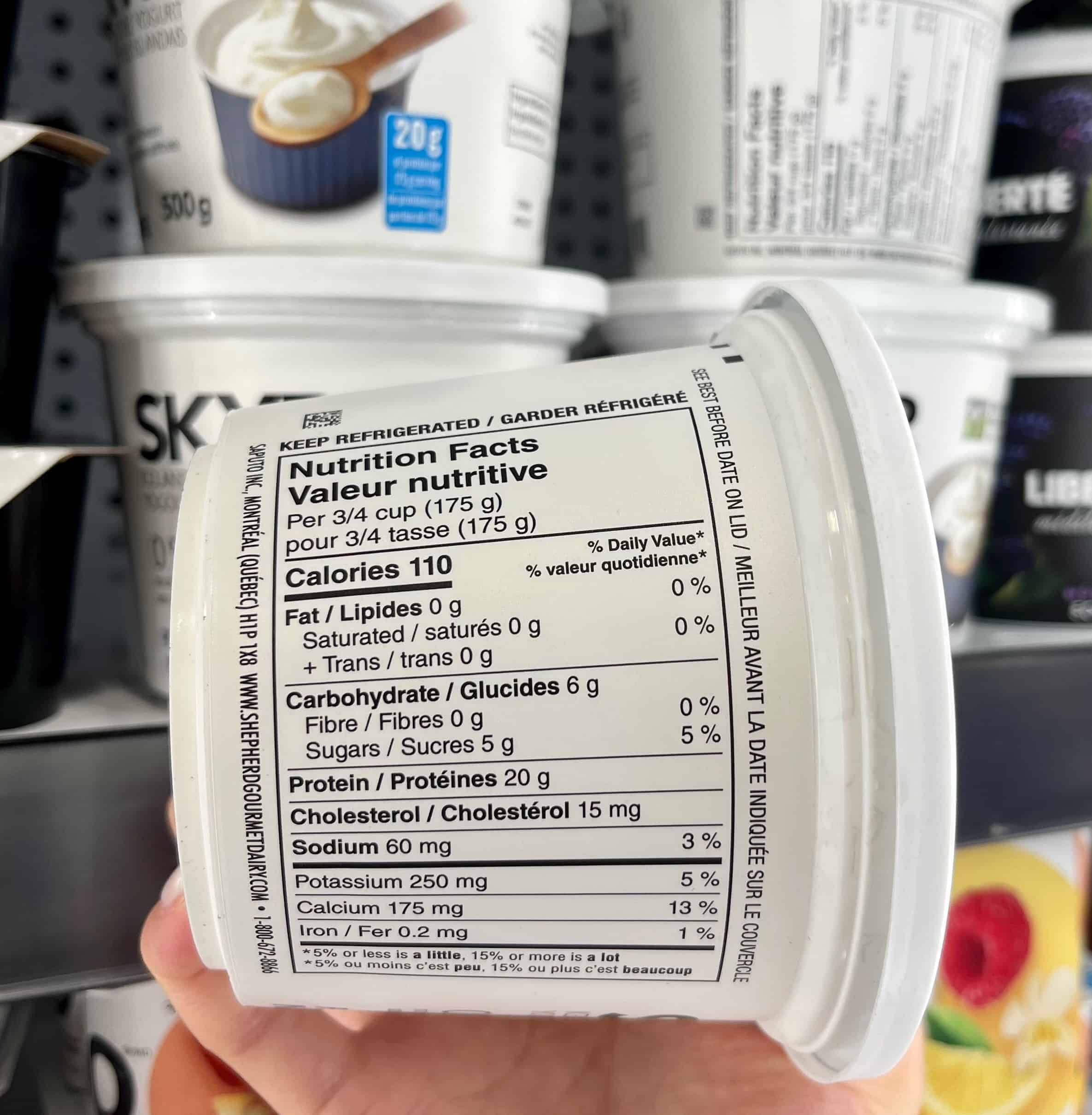
Reading the nutrition label helps to make informed (and healthy) choices!
What are Calories in Skyr Icelandic Yogurt?
A 3/4 cup serving of skyr Icelandic yogurt has about 110 calories along with high amounts of protein and many supporting, bone-building nutrients such as calcium, magnesium and phosphorus. Find more details below in our nutrition comparison chart.

A serving of Skyr has about 110 calories with around 20 grams of protein!
How Does Skyr Icelandic Yogurt Compare Nutritionally?
Skyr’s nutritional benefits vary from those in regular yogurt, cottage cheese or Greek yogurt, among other dairy products. See the nutritional comparison below for more information.
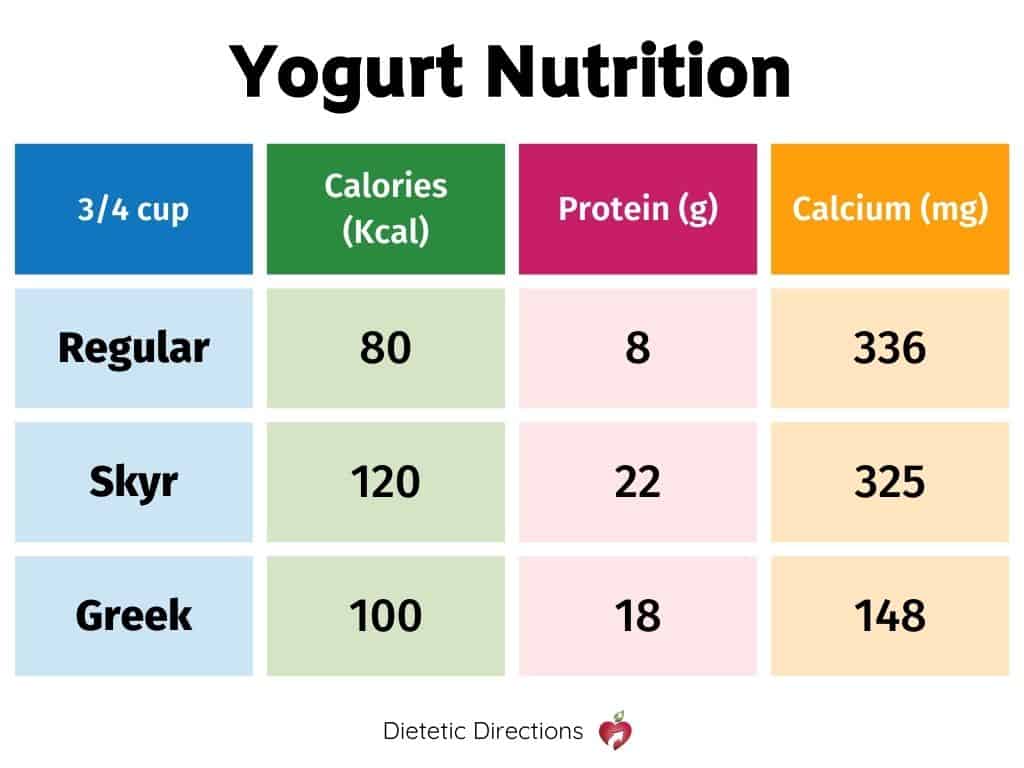
Nutritional Comparison to Other Dairy Products
Is Skyr Icelandic Yogurt Lactose Free?
Skyr is low lactose and generally fairly well tolerated by those with lactose intolerance. This occurs because the removal of whey protein removes approximately 90% of the lactose. However, everyone’s lactose tolerance threshold can vary. So the best practice for those with lactose intolerance is to trial a small portion of skyr (1/4 cup) and monitor for any digestive symptoms. Then, the amount can be increased the next day as tolerated. Working with our team of Registered Dietitians can help with managing lactose intolerance and digestive symptoms.
Working with a Registered Dietitian can support those with lactose intolerance manage their food intake without troublesome symptoms.
Is Skyr Icelandic Yogurt Low FODMAP?
Skyr tends to be lower in lactose, which makes it Low in FODMAPs. These are small, hard-to-digest sugars that trigger digestive discomfort like gas, bloating, pain and changes in bowel movements from loose to constipated. However, Monash University, renowned for its research, has not yet conducted any conclusive tests to determine the appropriate quantity of skyr yogurt to consume. They have tested a 3 tbsp serving of Greek yogurt and concluded that it contains moderate lactose, which is generally tolerated by those with digestive issues. Working with a specialized Registered Dietitian is recommended for those following the Low FODMAP diet as there are many intricacies in the process.
Work with a Specialized Registered Dietitian for Low FODMAP Diet support.
How to Include Skyr Icelandic Yogurt in the Diet?
Since skyr is such as nutritional rock star, here’s how you can include it in your diet:
Blueberry Chia Skyr Parfait for a mid-day snack!

A Skyr Parfait is a high-protein snack option!
 Add skyr to smoothies.
Add skyr to smoothies.
Easily add skyr to smoothies for protein and calcium boost!
Replace yogurt or cottage cheese at breakfast.

Using Skyr as a yogurt substitute helps boost protein and packs calcium too!
Mix skyr with homemade granola for a high-protein dessert.
Add this coconut crasin granola to skyr for extra crunch and flavour!
Spread on toast in place of Ricotta.
Feel free to swap out ricotta for skyr in this Garlic Rapini Toast recipe!
Add to Frittatas for protein boost.
Include skyr in this Veggie & Cheese Egg Casserole to increase protein intake!
Spread on naan breads for souvlaki pitas in place of plain yogurt.
Try skyr on your next souvlaki!
How long does Skyr Icelandic Yogurt last in fridge?
Skyr lasts in the fridge for up to 2 weeks in an airtight container. However, skyr Icelandic yogurt stays at peak freshness within 5 to 7 days of opening the container.

Skyr has a fridge-life of up to two weeks. Keep it at eye-level so you can use it more quickly.
Bottom Line:
Without a doubt, skyr Icelandic yogurt can be a wholesome addition to the diet. In particular, its high protein content of about 20 grams per ¾ cup serving is notable. However, healthy eating can look differently for individual dietary preferences and restrictions. Be sure to consult with your Registered Dietitian if uncertain which foods fit with your preferences and nutritional needs.

Now it’s your turn! Have you tried skyr Icelandic yogurt before? What is your go-to way to enjoy it as part of your diet?


